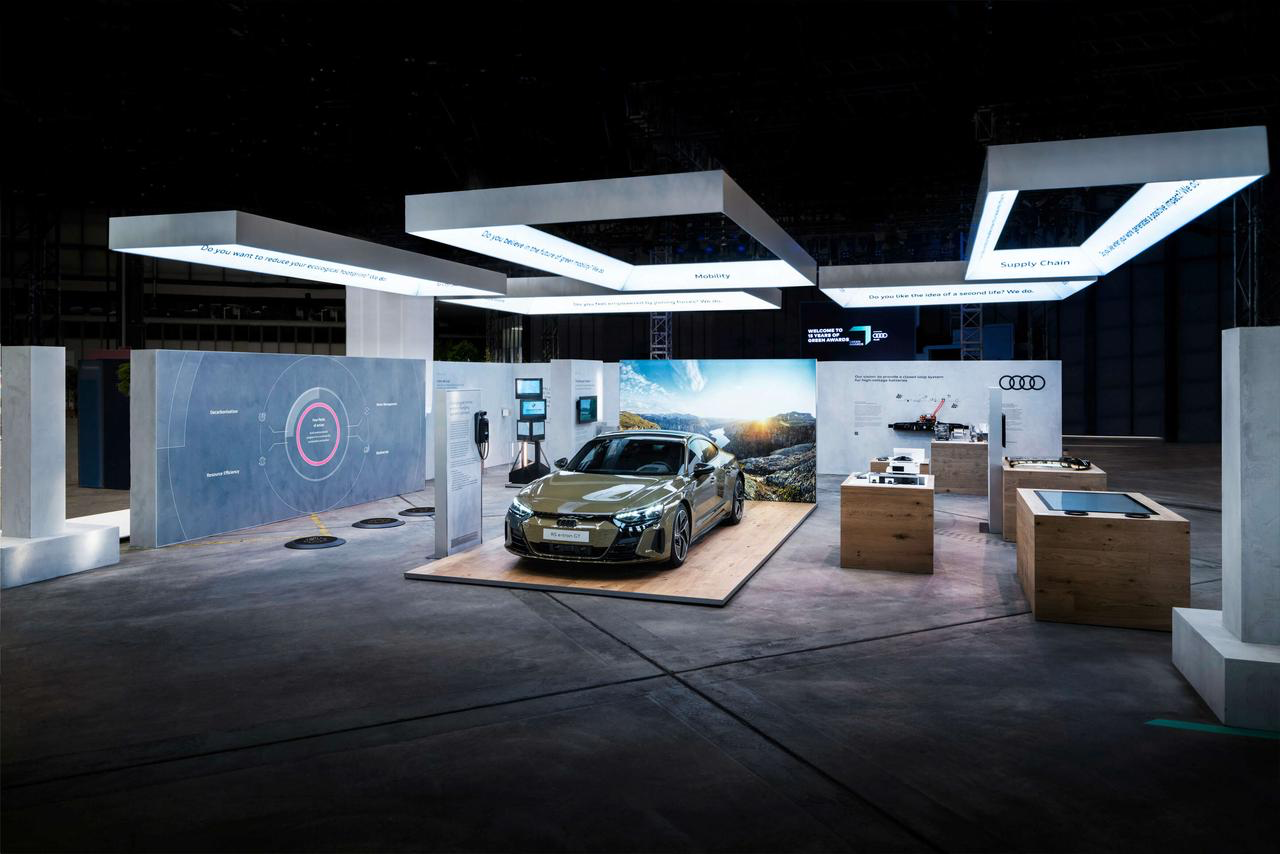As the largest celebration of green innovation, ideas and inspiration in Europe, the 2022 Greentech Festival focuses on the theme of “#TogetherWeChange” and will be held from June 22 to 24, 2022 at the former Berlin Tempelhof Airport.
As a founding partner, Audi participates in the Greentech Festival again and provides extensive insights into its sustainable development projects. At the Audi booth, visitors will learn about Audi’s practical technologies and concepts that promote sustainability in the value chain.
The Greentech Festival was co-founded by sustainable entrepreneur Nico Rosberg and two engineers, Marco Voigt and Sven Krüger, with the aim of providing an open platform for discussion on sustainable development, climate, and environmental protection issues, and shaping a sustainable future.
The 2022 Greentech Festival features various activities, including public forums, group discussions, keynote speeches, and training camps. Over 100 exhibitors, including Audi, are participating.
Audi’s Chief Strategy Officer, Silja Pieh, said:
Direct dialogue with various stakeholders, including critics, is crucial for us. By exchanging ideas and understanding more innovative sustainable development concepts, we benefit greatly.
Another highlight of the Greentech Festival is the Green Awards, which will be presented on June 22nd to recognize individuals, organizations, and start-ups for their innovative ideas in promoting sustainable development. Linda Kurz, the head of Audi Germany’s product marketing, is one of the winners.
Sustainable supply chain
Audi plans to reduce carbon emissions related to cars by 40\% from the 2018 level by 2030. To achieve this goal, Audi is adopting various measures to improve the sustainability of its supply chain. Thanks to the use of renewable energy, low-carbon materials, and secondary materials in its supply chain, Audi reduced carbon dioxide equivalent (CO2e) emissions by over 480,000 tons in 2021.
Under the circular economy strategy, Audi plans to establish more material recycling loops, and re-introduce waste raw materials into the production process. For example, Audi is working with partners Reiling Glas Recycling, Saint-Gobain Glass, and Saint-Gobain Sekurit to pilot an automotive glass recycling project. The new car windows produced from recycled glass will be used for Audi’s pure electric vehicles.

Carbon-neutral production facilitiesAs part of Audi’s sustainable production and logistics roadmap, the “Mission: Zero” environmental project aims to achieve carbon neutrality at all of Audi’s own production facilities by 2025.
In 2018, the Audi Brussels factory became the first large-scale mass production facility in the premium automotive sector to achieve carbon neutrality, and in 2020, the Audi Hungary factory followed suit. Meanwhile, the assembly process for the Audi e-tron GT at the Audi Neckarsulm factory has achieved net carbon neutrality.
Visitors to the Audi booth and outdoor area at this year’s Green Tech Festival can get up close and personal with this electric coupé model. In addition, the Audi Neckarsulm factory is currently conducting experiments on wastewater treatment, with the aim of recycling water that has been purified by nearby treatment facilities into the production process. Since 2019, the Audi Ingolstadt factory has been recycling treated wastewater for everyday use.
Audi’s first production base dedicated to pure electric vehicle models in China has been set up in Changchun, where an all-new information technology architecture will enable all processes to be interconnected. Implementation of the cross-regional environmental plan “Mission: Zero” will help to enable sustainable production, allowing for car manufacturing in Changchun to be conducted in a carbon-neutral and fully interconnected way.
To achieve fast charging in urban areas, Audi is constructing its Audi Charging Centers with high-power fast charge stations in more and more cities. The charging blocks at Audi Charging Centers use used lithium-ion batteries from dismantled Audi prototype vehicles as energy storage units. Audi hopes that the large-scale construction of fast charging stations will provide convenience for users in urban areas who are unable to charge their vehicles themselves.
Since its establishment, the Audi Charging Center pilot project in Nuremberg has achieved significant results, garnering unanimous praise from users, with 3,100 charging records recorded from January to the end of April 2022. Later this year, a new Audi Charging Center will be established in Zurich. Audi plans to build more charging centers in other regions, including Salzburg and Berlin.
The Audi Environmental Foundation provides funding for a range of sustainable projects, including collaboration between Audi and nonprofit start-up company Nunam to develop electric pedal-assisted cargo bikes.Currently, the training team of Audi Neckarsulm factory has developed three prototypes in collaboration with Nunam, which are powered by second-life batteries extracted from Audi e-tron test vehicles and have been piloted in India. The electric rickshaws will be used by non-profit organizations to enable women to earn an income by transporting passengers with these vehicles, while also providing them with a safe transportation option.

In Brazil, the Audi Environmental Foundation has partnered with Audi Brazil to support the non-governmental organization Litro de Luz Brasil to install solar-powered lights in three villages in the Amazon region, improving the living standards of local residents and making nighttime travel safer.
In the “URBANFILTER” project, the Audi Environmental Foundation has collaborated with the Technical University of Berlin to develop an intelligent filter for road drainage to prevent harmful environmental particles generated by tire wear from being washed into the sewer system and polluting water bodies.
This article is a translation by ChatGPT of a Chinese report from 42HOW. If you have any questions about it, please email bd@42how.com.
